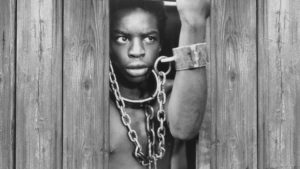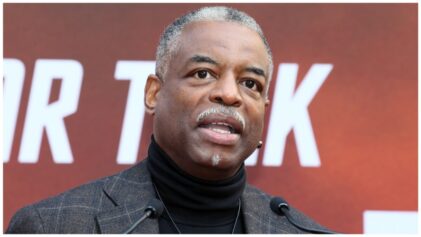
At first, I was confused as to why he would not immediately spare himself the crack of the whip and the tearing of his flesh by simply uttering the word, “Toby.” My confusion turned to anger at the cruelty of people who robbed this man of everything else and now wanted to rob him of the last semblance of his dignity and identity.
However, my anger turned to pride as I realized that though this young warrior was kidnapped, sold, branded and beaten, he remembered his name. Though he was treated like a beast of burden and breeding, he remembered his name. Though he was torn from his homeland, his culture and his family, he remembered his name.
This groundbreaking movie began with the birth of this warrior to a proud people in West Africa. It showed the concern of this warrior’s father as he struggled to name his legacy to the world.
After much deliberation and consultation with a village elder, the father not only gave his son a name designed to connect past and future generations, he performed a solemn ritual that served as the foundation for the strong will with which his son would live his life. He lifted him to the night sky, seemingly above all nations and all men and proclaimed to his progeny, “Kunta Kinte, behold the only thing greater than yourself.”
This is why I felt pride. It was not just the name. It was what it means to remember your name. Throughout his early years, the recitation of his name, whether uttered by his parents, grandmother, teachers or others, was a reminder of the legacy he was given and the legacy he would give.
It was a reminder of his infantile body, cradled in his father’s hands under the stars. His name was not only his identity, it was the identity of his family, his people and his nation. To wipe away his name was the same as wiping away an entire people.
The oppressors of that generation knew that to make a slave you must break a man. You don’t break the man by taking what is his. You break the man by taking who he is. In this instance it was taking his name. This is why this young warrior struggled with everything in him to say that which his fathers passed down to him. At that moment I felt that struggle.
I sat in history classes feeling inferior because the heroes I was shown in history looked nothing like me. My whipping was much more subtle than Kunta Kinte’s. My whipping was done slowly throughout my education through smiles and polite condescension. They tried to rob Kunta of his identity through intimidation and pain. It didn’t work. They robbed me of my identity through assimilation and deceit, and it almost succeeded. However, on January 23, 1977, this powerful scene liberated me.
The lesson I learned that night in 1977 is the lesson I hope is not lost on those young men and women who read this. Remember your name. You will hear many references to you that are subtle but repetitive. They are designed to make you forget that you were inventors, educators, warriors, priests and monarchs.
You will see many images of you. They are inconspicuous but constant. They are created to make you forget that you once stood before pyramids, ziggurats, universities and city centers. I challenge you. Do not forget your name. Do not lose your identity. Do not lose the legacy bequeathed to you from Eden by Adam, from Egypt by Ramses, from Nefertiti, Hatshepsut, Sunni Ali, Nzinga, Sundiata, Mansa Musa, and all of your people.
No matter how hard they may apply the proverbial whip.
Remember your name.
Mason West III has been an innovative leader in community-based program development for fifteen years. He has developed and managed programs for companies, schools, and governments at every level in the United States, England, and Bermuda. He specializes in prevention, intervention, and restoration strategies That restore lives and communities impacted by cyclical poverty, drugs, gangs, and violent extremism. Mr. West earned his Bachelor of Arts degree in Theology at Oakwood College. He later earned his Masters degree in Urban and Regional Planning and Community Development from Alabama Agricultural and Mechanical University. Currently, he is pursuing his Doctoral Degree in Educational Leadership at the University of Tennessee.

